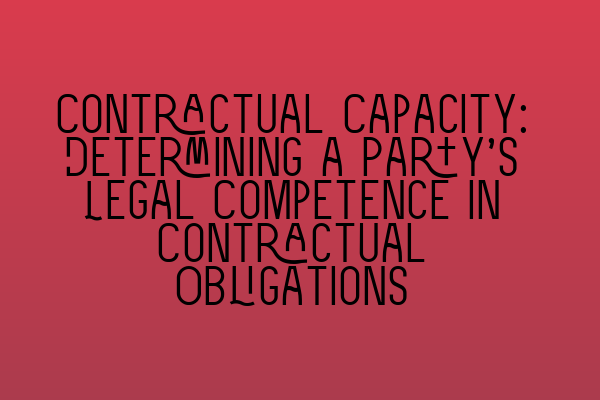Contractual Capacity: Determining a Party’s Legal Competence in Contractual Obligations
Contracts are the foundation of business transactions and legal agreements. They establish the rights and obligations of parties involved, and the enforcement of these contracts is critical for maintaining the integrity and stability of a commercial society. However, for a contract to be valid, it must be entered into by parties with the necessary legal competence or contractual capacity.
Contractual capacity refers to the legal ability of an individual or entity to enter into and be bound by a contract. This capacity is essential to ensure that the parties fully understand the terms and consequences of the agreement and have the mental and legal capacity to fulfill their obligations. In this article, we will explore the concept of contractual capacity, how it is determined, and its significance in contract law.
Understanding Contractual Capacity
Contractual capacity is based on the principle that a valid contract requires the mutual consent of competent parties. It ensures that the agreement is entered into freely, without any undue influence or coercion, and that both parties possess the mental and legal capacity to make informed decisions. Without contractual capacity, a contract may be voidable or unenforceable.
When determining the contractual capacity of a party, it is essential to consider various factors, including age, mental capacity, and legal status. Let’s explore each of these factors in more detail.
1. Age
Age plays a significant role in determining a party’s contractual capacity. Generally, individuals must reach the age of majority, which is 18 years old in most jurisdictions, to enter into a legally binding contract. Minors, those who have not attained the age of majority, typically lack the capacity to understand the consequences of their actions fully. Contracts entered into by minors are usually considered voidable by the minor, allowing them to disaffirm or cancel the contract. However, certain exceptions apply, such as contracts for necessities like food, clothing, and shelter or contracts approved by a court.
Learn more about the age factor and contractual capacity by checking out this article on SQE 1 Practice Exam Questions.
2. Mental Capacity
Another crucial aspect of contractual capacity is mental capacity. Parties must possess the ability to understand the terms of the contract, appreciate its consequences, and make informed decisions. Those who lack mental capacity due to mental illness, intellectual disabilities, or intoxication may not have the requisite capacity to enter into a contract. In such cases, the contract may be voidable or unenforceable.
Find out more about mental capacity and its implications in contractual obligations by referring to this informative article on SQE 1 Practice Mocks FLK1 FLK2.
3. Legal Status
Legal status refers to an individual’s legal rights and privileges within the given jurisdiction. It includes factors such as citizenship, residency status, and legal authority. Parties without the necessary legal status may not have the capacity to enter into certain types of contracts. For example, non-residents may face restrictions on purchasing property or entering into employment contracts. It is crucial to assess the legal status of parties involved in a contractual agreement to ensure their capacity.
Gain a deeper understanding of legal status and its impact on contractual capacity by reading this comprehensive guide on SQE 2 Preparation Courses.
Importance of Contractual Capacity
Contractual capacity serves several important purposes within contract law:
- Protection of vulnerable parties: Contractual capacity safeguards those who may be susceptible to exploitation, manipulation, or unfair treatment. It ensures that parties are not coerced or misled into agreements that they do not fully comprehend.
- Promotion of stability and confidence: Contractual capacity helps maintain the stability and predictability of commercial transactions. It provides certainty that the parties involved have the necessary understanding and ability to meet their contractual obligations.
- Preservation of fairness and justice: By ensuring that parties have the mental and legal capacity to enter into a contract, contractual capacity upholds principles of fairness and justice. It prevents a party from taking advantage of another’s vulnerability or lack of understanding.
Understanding contractual capacity is essential for lawyers, businesses, and individuals involved in contract law. By recognizing the factors that determine a person’s legal competence, parties can create enforceable contracts that protect their rights and interests.
To stay updated with the latest information and developments in contract law, take a look at our helpful articles on SQE 1 Preparation Courses.
Conclusion
Contractual capacity plays a vital role in determining the validity and enforceability of contracts. Age, mental capacity, and legal status are key factors in assessing a party’s legal competence in contractual obligations. By considering these factors, parties can ensure that their agreements are entered into freely and fairly, protecting the rights and interests of all involved.
For more information on contract law and related topics, explore our comprehensive resources and stay up to date with important dates and exam details by visiting SRA SQE Exam Dates.
